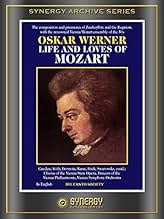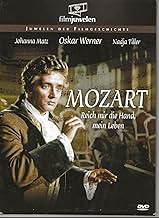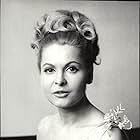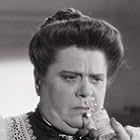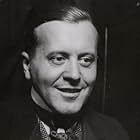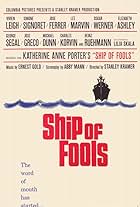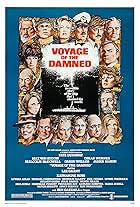IMDb RATING
6.2/10
125
YOUR RATING
Explores the mental state of Mozart during production of his final opera "Die Zauberflöte".Explores the mental state of Mozart during production of his final opera "Die Zauberflöte".Explores the mental state of Mozart during production of his final opera "Die Zauberflöte".
- Awards
- 1 nomination
Raoul Aslan
- Rosenberg, Hofkämmerer
- (as Raul Aslan)
Storyline
Did you know
- TriviaThe alternative German release title "Reich mir die Hand, mein Leben" is the common German adaption of the lyrics "La ci darem la mano" from Mozart's "Don Giovanni". The film itself doesn't contain a single note from this opera.
- ConnectionsFeatured in Falco - Verdammt, wir leben noch! (2008)
Featured review
If you agonized through "Amadeus", cringing at the depiction of a giggling buffoon and his featherbrained Constanze, shuddering at the underlying premise that God gave the gift to the wrong man for reasons we just can't understand, then this film may provide you with a pleasant antidote. Filmed in 1955, probably in anticipation of the bicentenary of his birth, it gives a totally different view of the composer, and recreates the last year of his life on a more intimate anti-blockbuster scale. But though it is an engaging effort with many fine points, it doesn't succeed in redeeming Mozart from the fictions of Milos Forman's travesty, because it is itself a fictionalization that distorts in its own way the character of the composer.
The last year of Mozart's life was a living hell since he was physically very ill and financially in difficulty. The necessity to keep composing was all the more tortuous because of his suffering. The symptoms he had - pain, vomiting, fever, chills, swollen hands and feet, seem to point to kidney disease. He was taking large quantities of various drugs and medicines, no doubt compounding the ailment. He knew death was inevitable and his wife was terrified.
This script by Karl Hartl depicts a fun-loving girl-chaser who dashes through the fields in pursuit of his mistress, climbs trees with her, cheating on Constanze with the certainty that she will forgive him. The girl in question is Nannina (Annie) Gottlieb who created the role of Pamina. In this version it is she, not Constanze, who becomes distraught over Mozart's illness. In the two biographies I consulted no mention is made of this exuberant love affair. It may be true, it may have happened earlier in his life or it may be Hartl's attempt to provide Mozart with a soul-sister, since the name Gottlieb is the German equivalent of Amadeus meaning "loved by God". The effect is to diminish the tragic end of his life and to shunt Constanze to the sidelines.
Salieri is a minor figure; there are just hints of animosity between the two men when Mozart's face darkens at the mention of his name. No mention either of "La Clemenza di Tito" the opera that had just failed in Prague, thus placing even more pressure on Mozart to succeed the next (and last) time, with "The Magic Flute". Freemasonry is not alluded to except through excerpts from the opera, nor is there any analysis of the symbolic shift from heresy to the deepest ritual of the Catholic Church - the Requiem Mass. But the mysterious stranger who commissions the Requiem cannot be avoided since he is the messenger of doom.
If what emerges is a buoyant, appealing tale of young man whose precociousness was rooted in a deep creative matrix, it is thanks to the radiant performance of Oskar Werner. His elegant, sensitive portrayal disarms and charms us to the point where we forget the distortions. We see in his portrayal the hunger for life, the need for love and approval, the disgust at compromise, the rebelliousness, the playfulness, the terror and acceptance of death. And all within the severe limitations of this so-called "historical" scenario.
The other players are excellent, in particular Erich Kunz as Emmanuel Shikaneder/Papageno. His clever, humorous, impatient pragmatism is a perfect complement to the unpredictable ways of creativity. The women are intelligently portrayed. The music is heavenly.
Unfortunately, this video is dubbed. I was not able to find a sub-titled version. I cannot say with certainty that Oskar Werner dubbed himself.
We are on the eve of the 250th anniversary of Mozart's birth. Vienna, I believe, is already celebrating. Let's hope that any books, films or dramatizations that emerge from the festivities reflect the man in all his complexity. Truth is not only stranger than fiction, it's a lot more interesting. It might be best to just read his letters and listen to his music.
The last year of Mozart's life was a living hell since he was physically very ill and financially in difficulty. The necessity to keep composing was all the more tortuous because of his suffering. The symptoms he had - pain, vomiting, fever, chills, swollen hands and feet, seem to point to kidney disease. He was taking large quantities of various drugs and medicines, no doubt compounding the ailment. He knew death was inevitable and his wife was terrified.
This script by Karl Hartl depicts a fun-loving girl-chaser who dashes through the fields in pursuit of his mistress, climbs trees with her, cheating on Constanze with the certainty that she will forgive him. The girl in question is Nannina (Annie) Gottlieb who created the role of Pamina. In this version it is she, not Constanze, who becomes distraught over Mozart's illness. In the two biographies I consulted no mention is made of this exuberant love affair. It may be true, it may have happened earlier in his life or it may be Hartl's attempt to provide Mozart with a soul-sister, since the name Gottlieb is the German equivalent of Amadeus meaning "loved by God". The effect is to diminish the tragic end of his life and to shunt Constanze to the sidelines.
Salieri is a minor figure; there are just hints of animosity between the two men when Mozart's face darkens at the mention of his name. No mention either of "La Clemenza di Tito" the opera that had just failed in Prague, thus placing even more pressure on Mozart to succeed the next (and last) time, with "The Magic Flute". Freemasonry is not alluded to except through excerpts from the opera, nor is there any analysis of the symbolic shift from heresy to the deepest ritual of the Catholic Church - the Requiem Mass. But the mysterious stranger who commissions the Requiem cannot be avoided since he is the messenger of doom.
If what emerges is a buoyant, appealing tale of young man whose precociousness was rooted in a deep creative matrix, it is thanks to the radiant performance of Oskar Werner. His elegant, sensitive portrayal disarms and charms us to the point where we forget the distortions. We see in his portrayal the hunger for life, the need for love and approval, the disgust at compromise, the rebelliousness, the playfulness, the terror and acceptance of death. And all within the severe limitations of this so-called "historical" scenario.
The other players are excellent, in particular Erich Kunz as Emmanuel Shikaneder/Papageno. His clever, humorous, impatient pragmatism is a perfect complement to the unpredictable ways of creativity. The women are intelligently portrayed. The music is heavenly.
Unfortunately, this video is dubbed. I was not able to find a sub-titled version. I cannot say with certainty that Oskar Werner dubbed himself.
We are on the eve of the 250th anniversary of Mozart's birth. Vienna, I believe, is already celebrating. Let's hope that any books, films or dramatizations that emerge from the festivities reflect the man in all his complexity. Truth is not only stranger than fiction, it's a lot more interesting. It might be best to just read his letters and listen to his music.
- AndreaValery
- Sep 24, 2005
- Permalink
Details
- Release date
- Country of origin
- Language
- Also known as
- Reich mir die Hand, mein Leben
- Production company
- See more company credits at IMDbPro
- Runtime1 hour 27 minutes
- Sound mix
- Aspect ratio
- 1.33 : 1
Contribute to this page
Suggest an edit or add missing content

Top Gap
By what name was The Life and Loves of Mozart (1955) officially released in Canada in English?
Answer
